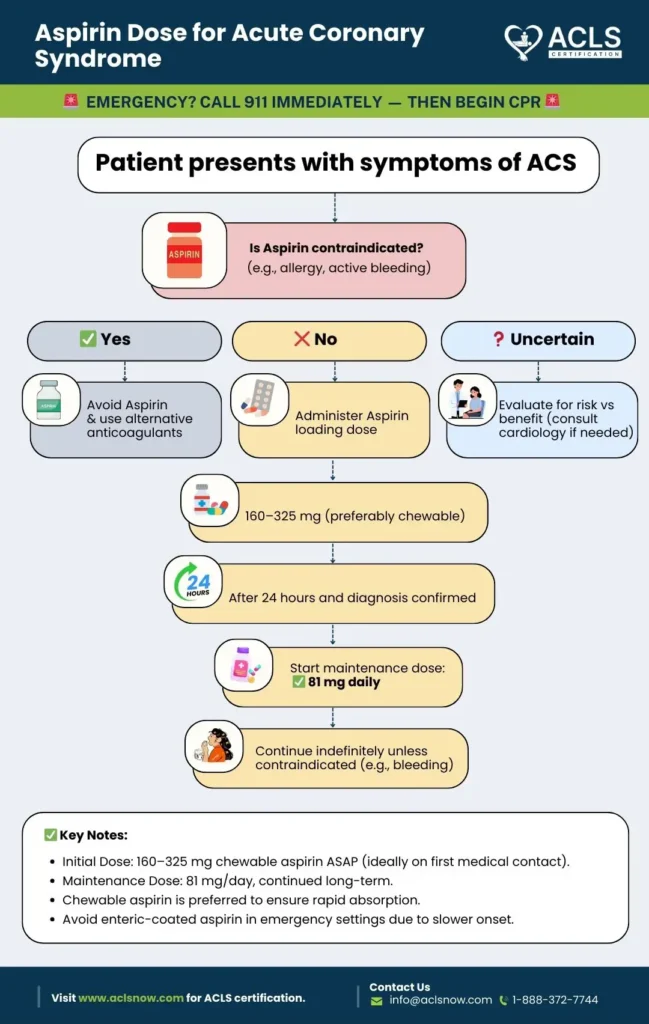Table Of Content(s)
- Aspirin Dose For Acute Coronary Syndrome ACLS
- What are the benefits of Aspirin in ACLS emergency situations?
- What is the aspirin dose for acute coronary syndrome ACLS?
- What are the post-treatment considerations?
- Conclusion
Acute coronary syndrome is a critical cardiac condition that involves several signs and symptoms. This includes myocardial infarction and unstable angina. Causing almost 400,000 deaths per year, acute coronary syndrome is more common in males than females. Among the various treatments available, aspirin plays an important role in the management of acute coronary syndromes. Administration of precise ACLS aspirin dose is important for the successful recovery of the patient. The dosage of aspirin may seem straightforward but requires accurate administration for maximized therapeutic benefits.
In this blog, we will delve into the recommended aspirin dosage for various advanced cardiovascular conditions. Understanding these guidelines will enhance your ability to provide high-quality, evidence-based care during critical cardiac events.
Master ACLS Now
Get ACLS certified with confidence
What are the benefits of Aspirin in ACLS emergency situations?
Understanding the benefits of Aspirin in the management of cardiovascular problems is crucial. The ability of this drug to rapidly address the underlying problems associated with acute coronary syndrome, makes it a crucial ACLS drug. Below mentioned are the benefits of aspirin in managing acute coronary syndrome, in the background of ACLS.
- Reduces Platelet Aggregation: Aspirin inhibits platelet cyclooxygenase (COX-1), reducing the formation of thromboxane A2, a key molecule in platelet aggregation. This action helps prevent further clot formation and stabilizes the existing thrombus.
- Decreases Risk of Myocardial Infarction Progression: By preventing additional clot formation, aspirin limits the progression of myocardial infarction, thereby preserving heart muscle and improving overall cardiac function.
- Enhances Outcomes When Administered Early: Timely administration of aspirin, especially within the first few hours of symptom onset, can significantly improve survival rates and reduce the severity of cardiac events.
- Simple and Cost-Effective: Aspirin is an easily accessible, inexpensive medication with a well-established safety profile, making it a practical choice in emergency settings.
- Supports Comprehensive ACS Management: When used in conjunction with other treatments such as thrombolytics and anticoagulants, aspirin helps create a multi-faceted approach to Acute Coronary Syndrome management, addressing both clot dissolution and prevention.
- Facilitates Rapid Action: Aspirin is a widely available and rapidly acting medication that can be administered quickly in various healthcare settings, including pre-hospital and hospital environments. This ensures timely treatment for patients with acute coronary syndrome.
Read More: ACLS Certification in North Dakota
What is the aspirin dose for acute coronary syndrome ACLS?
Aspirin is a critical component that stands crucial for the treatment of acute coronary syndrome. The primary function of this drug is to inhibit platelet aggregation and stop blood coagulation. Proper dosing of aspirin is important for ensuring optimum patient care.
Aspirin Dose for Acute Coronary Syndrome:
- Initial Dose: The recommended dose for an acute coronary syndrome event is 160 to 325 mg of aspirin. This dose is typically administered orally as soon as possible after the onset of symptoms.
- Administration Route: Aspirin should be chewed or crushed for faster absorption and more immediate effect. Avoid swallowing it in whole.
- Frequency: In the acute setting, aspirin is usually administered as a single dose. Repeated doses are not generally recommended unless further treatment protocols or guidelines specify.
- Formulation: Aspirin should be administered as uncoated or chewable tablets, which facilitate quicker absorption and onset of action.
- Contraindications: Ensure that the patient does not have any contraindications to aspirin, such as severe allergy or active gastrointestinal bleeding, which would necessitate alternative treatment approaches.
- Integration with Other Therapies: Aspirin is used alongside other treatments in the ACLS protocol, including thrombolytics or antiplatelet agents. This provides a comprehensive approach to managing Acute coronary syndromes.
Read More: Identifying and Treating First-Degree AV Block (First-Degree Heart Block)
What are the post-treatment considerations?
After administering aspirin for acute coronary syndrome, there are few important considerations to keep in mind. The post-treatment considerations include monitoring, assessing treatment effectiveness and ongoing planning for post-treatment care. These are the post treatment critical aspects:
-
Monitoring for side effects
- Gastrointestinal Issues: Aspirin can cause gastrointestinal irritation or bleeding. Monitor for symptoms such as abdominal pain, nausea, or melena.
- Allergic Reactions: Be observant for any signs of allergic reactions, including rash, itching, or swelling.
- Bleeding Risks: Watch for signs of bleeding complications, particularly if the patient is on additional anticoagulant therapy.
-
Assessing Treatment Efficacy
- Symptom Resolution: Evaluate whether the patient’s symptoms have improved, such as chest pain reduction or stabilization of vital signs.
- Follow-Up Testing: Consider additional tests, such as EKGs or cardiac biomarkers. This will successfully assess the effectiveness of aspirin and other treatments.
-
Coordination With Therapies
- Antiplatelet Therapy: Ensure that aspirin is part of a broader antiplatelet regimen if indicated. Coordinate with medications like clopidogrel or ticagrelor based on updated guidelines.
- Thrombolytics or Anticoagulants: Monitor the interaction with other treatments administered for acute coronary syndrome and adjust as necessary.
-
Long Term Management
- Secondary Prevention: Discuss long-term management strategies to prevent recurrent acute coronary syndrome. This includes continued aspirin therapy along with lifestyle modifications, and management of hypertension, diabetes, and hyperlipidemia.
- Patient Education: Provide education on the importance of adhering to prescribed medications. Teach them about recognizing signs of complications, and making necessary lifestyle changes.
Read More: Synchronized Cardioversion ACLS Cheat Sheet
Conclusion
In the management of acute coronary syndromes, Aspirin continues to be an indispensable treatment option. The ideal ACLS aspirin dose should typically be between 160 to 325 mg. It should be chewed and crushed but never wholly swallowed. In summary, understanding and correctly applying aspirin dosage can set the foundation for a positive and long-term cardiac health. Stay updated with the ACLS guidelines and continue providing quality care in critical scenarios concerning acute coronary syndromes.








